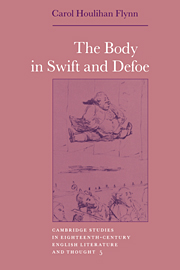Book contents
- Frontmatter
- Contents
- Acknowledgments
- List of abbreviations
- Introduction “The Dearness of things”: the body as matter for text
- 1 Dull organs: the matter of the body in the plague year
- 2 The burthen in the belly
- 3 Consuming desires: Defoe's sexual systems
- 4 Flesh and blood: Swift's sexual strategies
- 5 The ladies: d—ned, insolent, proud, unmannerly sluts
- 6 Chains of consumption: the bodies of the poor
- 7 Consumptive fictions: cannibalism in Defoe and Swift
- 8 Vital parts: Swift's necessary metaphors
- Afterword Suppose me dead; and then suppose
- Index
7 - Consumptive fictions: cannibalism in Defoe and Swift
Published online by Cambridge University Press: 21 September 2009
- Frontmatter
- Contents
- Acknowledgments
- List of abbreviations
- Introduction “The Dearness of things”: the body as matter for text
- 1 Dull organs: the matter of the body in the plague year
- 2 The burthen in the belly
- 3 Consuming desires: Defoe's sexual systems
- 4 Flesh and blood: Swift's sexual strategies
- 5 The ladies: d—ned, insolent, proud, unmannerly sluts
- 6 Chains of consumption: the bodies of the poor
- 7 Consumptive fictions: cannibalism in Defoe and Swift
- 8 Vital parts: Swift's necessary metaphors
- Afterword Suppose me dead; and then suppose
- Index
Summary
In a Word, The Nature and Experience of Things dictated to me upon just Reflection, That all the good Things of this World, are no farther good to us, than they are for our Use.
Robinson Crusoe, p. 129I had settled my little Oeconomy to my own Heart's Content… I soaled my Shoes with Wood which I cut out from a Tree, and fitted to the upper Leather, and when this was worn out, I supplied it with the Skins of Yahoos dried in the Sun. I often got Honey out of hollow Trees, which I mingled with Water, or eat it with my Bread. No man could more verify the Truth of these two Maxims, That Nature is very easily satisfied; and That Necessity is the Mother of Invention.
Gulliver's Travels, p. 276The insular life possesses its simple virtues, as Crusoe and Gulliver readily admit. Fish are jumping, the Yahoos are nigh, and so long as you are able to content yourself with rough fare, Gulliver's oats and whey, Crusoe's goat stew, with an occasional enemy thrown in for variety (Yahoos melt down into a rather serviceable tallow), you will agree that on the whole “Nature is very easily satisfied.” Swift and Defoe, on the other hand, fleshing out the more problematic aspects of such modest economies, do not allow such pastoral dodges. They call attention in their fiction to “the Dearness of things necessary to Life.”
- Type
- Chapter
- Information
- The Body in Swift and Defoe , pp. 149 - 176Publisher: Cambridge University PressPrint publication year: 1990



